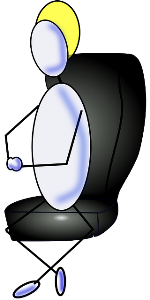
Writing an article for a newsletter early in 2014 coincided with the realisation I have been working alongside people with brain injury and their families for over 25 years!
I was asked to submit an article to a Newsletter prepared by the Senior Masters Office in Melbourne, Australia for their many beneficiaries.
This request also came at a time when my father’s condition deteriorated after years of living with Dementia. I wrote IMAGINE, about thoughts I had when Dad died in April 2014.
What follows is a reprint of the article originally published in the Senior Masters Office. You can also see this in the Newsletter along with other information published by the Senior Masters Office.
A Few Short Lessons Learned About Brain Injury
My father has advanced dementia, as I sat with him recently I thought about what an extraordinary organ the brain is. It can help us achieve incredible things.
Yet it can also cause all sorts of changes when it is damaged, some of which seem beyond belief: a person finding they have a different accent when they speak, finding new, previously unknown, skills, such as an accountant finding she had artistic skills she never dreamed of. Or a person having such rigid thinking, it prevents them changing a course of action, no matter how disastrous the outcome might be. And those like my father for whom the function of the brain slowly fades.
As I thought about the changes in my father’s behaviour I considered the many, many people I have met and the range of outcomes they each have from brain injury. This led me to count up the years. With a shock I realised that 2013 marks 25 years that I have been working with people living with brain injury, their families and support networks.
I started to wonder, as I watched my father, what I had learned in all those years that might be helpful now. Here are a few thoughts that came to mind. I hope it might also be useful to others.

Brain injury happens to families.
Brain injury changes lives forever – for the person with brain injury, and for their family. Like throwing a stone into the pond the ripples spread. Sometimes looking from the outside, it can seem families may not be doing the right thing. Mostly families are doing the best they can. They are the ones there for the long haul.
Support the family, support each other, and you support the person with brain injury.
We do better when we start from what we are good at.
Most of us, brain injury or not, do better when we focus on our strong points, when we build on what is already working well.
We tend to do less well when the focus is on our faults, our difficulties, our weaknesses. Unfortunately for people with brain injury shortcomings are often the focus.
Even if it is not your natural approach work on finding out what a person can do. Find out what their strengths are. Build from these to change behaviour and develop skills.
‘Neuroplasticity’ is a word worth knowing more about.
Science now knows what families have known for years; the brain can change. While brain injury might be lifelong, for people who have a traumatic brain injury working towards improvement can have positive results. Improvement does not plateau, improvement can continue throughout life. Important new thinking is showing that other parts of brain can take over some functions from damaged cells.
The brain makes new pathways, cells take up new functions, but it needs practice to maintain them. Practice, Practice, Practice.

If you don’t use it you lose it!
The more we do something, the stronger the connections in the brain will be, and the more likely it will become learned and continue. Like well-worn tracks the pathways become deeper and stronger. We can look for neural pathways (say, familiar activities) that are already strongly made and build from these and we can start building new pathways.
We need to continue to use the skills and knowledge we have or they will fade.
Swearing has its own part of the brain – but that’s not an excuse.
Brain injury can make people say and do things that are not OK. It’s not deliberate. It’s not personal. It’s the brain injury. It does not mean you do nothing about it.
Try and remember it’s the brain injury not the person. Don’t take things personally. Work together to find consistent strategies to help manage behaviour.

The brain is the BOSS, it controls everything we do. To do its job well, it needs to be well looked after.
The brain is a greedy Boss, it needs constant and instant energy to keep it going. It has no place to store the energy it needs. With or without brain injury; before, during and after injury; the brain benefits from a good and healthy life.
Look after your brain. Give it the energy it needs with good food, exercise, adequate sleep, good health. Oh and avoiding harmful substances.
Empathy and Compassion are life changers.
Blame, criticism, anger, guilt, sadness, grief. There are many emotions that every person involved can experience after brain injury.
Empathy and compassion have a reputation for being soft and fuzzy, for being weak. When really, they take a lot of practice, they help understand the emotions that come with brain injury, and they can change lives.
Don’t be afraid. Learn about and practice kindness, compassion, and empathy. Put yourself in the other person’s shoes.
Woodpeckers don’t get brain injury even with all that pecking

I have no idea how that useless fact is known, nor what use it is, but it is fascinating to think upon.
Remember we do not know all there is to know about the brain.
We could talk much more about each of these points, and there is so much more that has been, and will be discovered, about living with brain injury.
My final thought to myself and for you, is to keep learning from each other, and never give up.